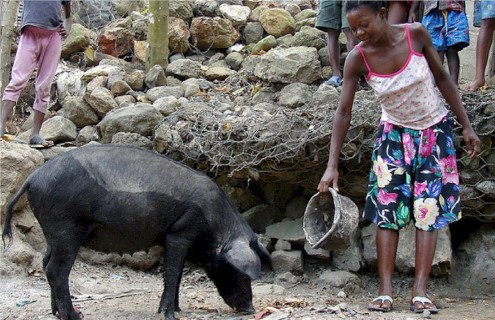The Creole Pig
was a breed of pig indigenous to the
Caribbean nation of Haiti. Creole pigs are
well adapted to the rugged terrain and sparse vegetation of Haiti. The pigs
resilience allowed Haitian peasants to raise these pigs with little resources.
The peasants characterized their pigs as
never getting sick.
For generations,
the Haitian Creole pig had been a poor Haitian familys most important economic
asset. Rugged foragers that coped well in Haiti’s tropical climate, Creole pigs
were cheap and easy for peasant families to raise. Beyond meat, the pigs real
significance lay in their role as a peasants savings bank an asset that could easily be tapped into
when cash was needed. These dark black pigs
were known for their boisterous nature and have been incorporated into elements
of vodou folklore and the oral history of the Haitian revolution.
In the early
1980s an outbreak of African swine fever hit the neighboring Dominican
Republic. Officials feared the flu might spread throughout Haiti and to the
United States, where it could devastate the pork industry. The United States
Agency for International Development, known as USAID, and the Haitian
government led a campaign, known by the French acronym PEPPADEP, to exterminate
Haitis pigs. Farmers who were compensated received pigs imported from the
United States that were far more vulnerable to Haiti's environment and
expensive to keep. In the year following the slaughter, levels of enrollment in
schools were dramatically lower throughout Haitis countryside.
In the Haitian
peasant community, the governments eradication and repopulation program was
highly criticized. The peasants protested that they were not fairly compensated
for their pigs and that the breed of pigs imported from the United States to
replace the hardy Creole pigs was unsuitable for the Haitian environment and
economy.
In recent years,
Haitian and French agronomists have bred a new variety of pig similar to
Haitis Creole pig. An effort to repopulate Haiti with these pigs is underway.

